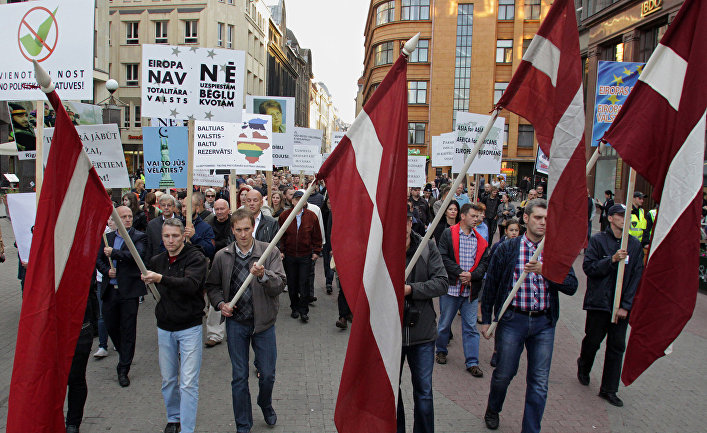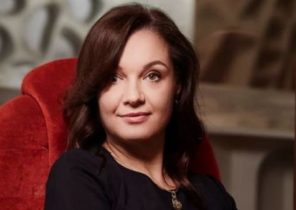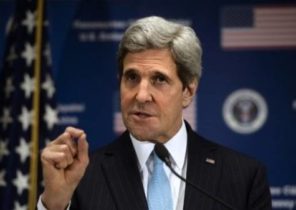
Neatkarīgā asked the Ambassador for special assignments of the foreign Ministry of Latvia, co-chair of the group on humanitarian issues of the Latvian-Russian intergovernmental Commission Andris Vilcans to Express their opinion on important what of Latvia taking into account what is happening in the world and Europe will need to be considered this year.
NRA: Doing their job, you saw the world with my own eyes in all its all, so we can assess what is happening and expected in the broad context. What do you particularly focus in the current year, mainly for Latvia? Of course, I want it to be not an official opinion and to present a subjective attitude.
Andris Vilcans: I I note: what I will tell you more will be my personal, rather than official opinion. 2017? First, as strange as it may seem, but the 17th to a certain extent will take place in the shadow of the 100th anniversary of the October revolution, or the so-called great October socialist revolution, or the newest version, the RAID of the German General staff. It seems to me that in our part of the world this anniversary will give some material for thought. One hundred years — but have we managed to overcome the consequences of the coup?
Given relations these days, it seems that very desirable “material for thought” will be suppressed by the desire of all parties to use this fact for their pointless political speculation.
— Yes, it’s almost inevitable. But this does not mean that the mentioned event should not try to understand. No one still can not with certainty say what really happened in 1917? And the First world war is almost forgotten. Although in Europe, primarily in France and England, it left almost no more imprint than the other. This is linked to the Foundation of the Republic of Latvia. And what in the end our attitude to the arrows? They’re such a page of history that is impossible to erase or tear out. Now often hard at trying to circumvent that was generally the arrows, especially the red, although they actually played an important role in history. Latvians are not very many, say, phenomena that make clear our participation in history. Besides, not only in Latvia… unfortunately, this issue is overly politicized. I don’t think we should be ashamed of their compatriots who have demonstrated heroism, even though fought for the “wrong” side. Otherwise, how to understand a large exhibition in a London Museum dedicated to the Latvian fighters of 1905 under the leadership of Jakob Peters (Peters-Artist), who on behalf of the party tried to Rob the Bank? One of the exhibits — shot cylinder of Winston Churchill, he led the operation against five Latvian fighters, which was attended by 750 police and Scots guards. By the way, recently in St.-Petersburg, street of the Latvian firm, which was engaged in reconstruction of the area, set up a stele in memory of those who fought in the First world war the Latvian arrows.
But that is a lot of speculation, no doubt. In 2011, the late President of Israel Shimon Peres said: “In this age of revolutions and crises we lost the past and built the future. If I could someone to suggest something, I would say: leave the past alone. The past no longer exists. Let it rest in peace, we will not interfere in it and reference it. The future is new and demanding. Let our children learn to dream, to anticipate, to find a vision of the future”. Wise words, but to completely get rid of the past, no one can. Past history should know. At least in order not to repeat the same mistakes.
— Will I have this year to think of existence in a crisis of civilization?
— I think I have to. The economic crisis of 2008-2009 was severe, but… nothing is over. If you believe the many predictions, now it all starts. But we in Latvia don’t like in a quiet Harbor. We can say that in many areas we were somewhat in the shadow of Europe. Everything happens — just not here. Especially in connection with refugees, terrorism. The refugee crisis we are really not affected. This storm in a teacup over a few dozen refugees just comical.
— If “is still only the start”, why the policies of the European Union is still clearly and understandably articulated to the society the level of internal and external threats we may face? And why in our “safe Harbor” political practice preach rhetorically inadequate policy level threats? In my opinion, this rhetoric of threats requires active mobilization policy in connection with such phenomena as bi-communal state, the ethnic vote “the fifth column”. But no movement in this direction is not visible…
— With this I can partially agree. Potential threats are often exaggerated. First, it discourages investment. If we focus our anxiety, increased level of danger and threats, what investor in his right mind would invest in a country that can say that, God forbid, will be conquered?
But we cannot say that the threat is invented out of the blue. Some concerns about the possible behavior of our neighbor to the East exist. Who five years ago could have imagined all this adventure with Ukraine?
— It will soon be three years since Russia invaded Crimea, and a few years of the expansion of refugees to Europe. Therefore, it is even more unclear why the leaders of the EU and Latvia prefer to intimidate people and bring it to their attention, what should be considered and what to do. Why not stop, at least the production of fear?
— These sentiments to a greater extent also depend on the family. From the influence of the school. And importantly, we should think with your head. In fact, critical thinking is quite underdeveloped — many rely on uncritically spread by the media or word of mouth messages.
At the current scale of the information war is almost impossible to distinguish where truth and fiction. Of course, there are methods with which you can determine the degree of reliability of the information, but how many of us have the time and the knowledge to do it? Besides, this is “creativity” the media may not even be a political order, but simply a desire to include some “splash” to raise the rating of the TV program or the circulation of the publication. Journalists aren’t what they were before. Journalism, as such, more degree died. If the earlier news was done by reporters, now, the Agency presented to journalists the news they then set out…
— Do you also think that after the inauguration of Donald trump expected some significant changes in US foreign policy, in relations between the EU and the US?
— Indeed, the election of Donald trump caused a nervous reaction of the society and establishment not only in USA but also far beyond. But if you remember the caricature Herluf Bidstrup “pre-Election hot”, you know, campaign promises are one thing, but the real policy after the election victory, is often quite different. Let’s wait and see… But be aware that in the U.S. not a monarchy, and even the President is not able in a short time to dramatically change the policy, it does not allow a complex mechanism of public administration, which has a large inertia. One of the reasons for the victory of trump in that people do want real change, which in case of victory, Hillary Clinton was virtually no hope. How to write my friends from the US — the intellectuals of the Latvian origin, they voted for trump in the hope that he will put an end to exaggerated political correctness.
But the biggest intrigue is connected with plans of Donald trump (if they exist) in tandem with the Rothschild family to produce the reconfiguration of the global financial system in order to back “a machine for printing dollars” from the Federal reserve system under the control of the US government and possibly return to the gold coverage of the dollar. Unless it’s the imagination of fans of conspiracy theories, but the real plans, of course, the global financial system, and many other areas, including foreign policy, expect a very large shocks (like the great depression in the US 1929 — only now on a global scale) and change.
— In the context of these opportunities, or whatever they can this year to change the relationship between the EU, USA and Russia? Even Europe is already beginning to count the damage that it has caused sanctions. Germany only counted about 20 billion euros…
I think it is exaggerated the numbers… the Data of the Austrian research Institute of the national economy the following: the greatest losses in connection with the sanctions and their consequences in 2015 came to Germany (over 6 billion euros and the loss of 97 thousand jobs), France (1.6 billion) and Poland (1.3 billion).
It’s not too little, but I don’t think in this case, for economic reasons, it is possible to sacrifice Ukraine. We have to save face…
With regard to Latvia, Russia remains an important trading partner, third biggest importer of Latvian goods (7,52% of total exports) and fourth largest exporter (8,35%). For comparison: in the first place Lithuania, respectively, of 17.55% and a 17.14%. (Data for 3rd quarter of 2016). However, the turnover is decreasing, and economic relations with Russia for Latvia is not as strategically important as it was in 90-e years. Gradually reduced as the volume of transit of goods Is an objective process that Latvia can not affect. Termination of transit of goods through the ports of Latvia is a political decision. Russian ports and transport companies are insufficiently loaded.
— You were the Ambassador of Latvia to Ukraine. What processes are in this state you think is more likely?
— On the basis of its seven-year experience of the Ambassador in Ukraine, I would venture to Express the heretical thought. In my opinion, the most suitable for Ukraine in the form of construction of the state is a Federation like Germany. I think most of those people who, like me, visited all regions of Ukraine and got acquainted with their characteristics, will agree with me, even if you are afraid to say out loud about it. All agree that Western Ukraine is significantly different from Eastern, but I see no differences exist at the level of regions and even individual cities (e.g., Odessa). We must not forget that in 17-20 years of the last century on the current territory of Ukraine was proclaimed on 16 (!) political entities with claims to statehood. These formations were often hostile to each other and had no desire to unite. With the current degree of centralization is difficult to imagine the possibility of electing the Parliament and the government that will deepen this regional specificities and try to take it into consideration. It would be logical to delegate much of the authority to the governments and parliaments of the “länder”, leaving the “center” only characteristic of the Federal government functions. I think that federalization in one form or another will take the threat of fragmentation of authority and collapse of a single state, and will open the way to reintegration in Ukraine breakaway regions. I understand that now it is a utopia, but the other way do not see.
— This year, at the political level, particularly close should take to heart Latvia?
I’m not a legislator, and it’s not really my business, but I think that you need to understand the reforms in health, education, and tax reform.
Taxes. There is no need to reform for the sake of reforms. They should be thought out, calculated. Of course, the abolition of taxes for small business or reduced income tax after some time will have a positive impact on the economic activity of the population and increase the weight of taxes. However, the salaries of teachers and other state employees, pensions, etc. you have to pay today, not in the uncertain future. Than to patch this “transition” period? Again to return to international loans? Or are there other options? But the main question is, of course, rhetorical: where to get this electorate that will vote for reformers and not once again for those who failed one economic policy after another and, moreover, retained power? And equally important, where to get the politicians of the younger generation, who will be willing to at least try to change something in those areas in which we obviously do not have success?
(Published slightly abridged).







